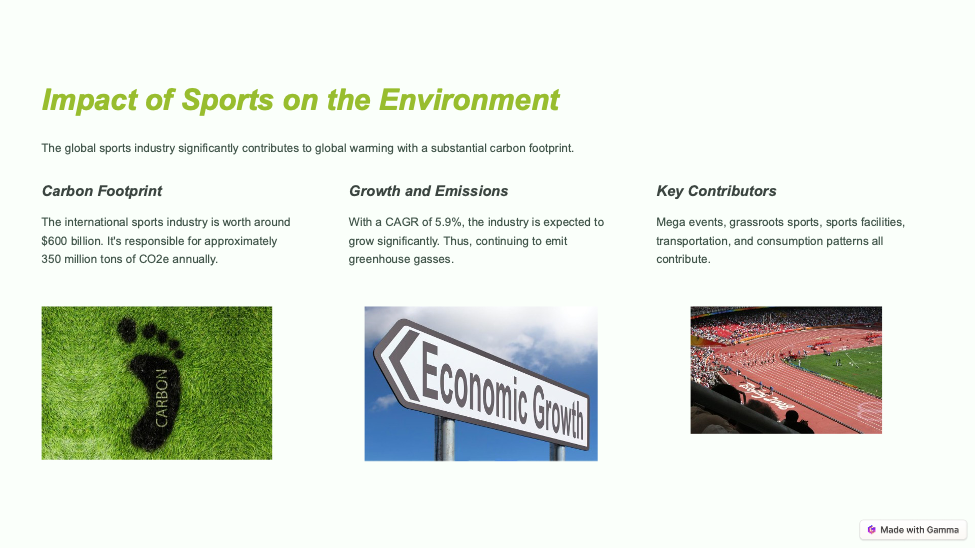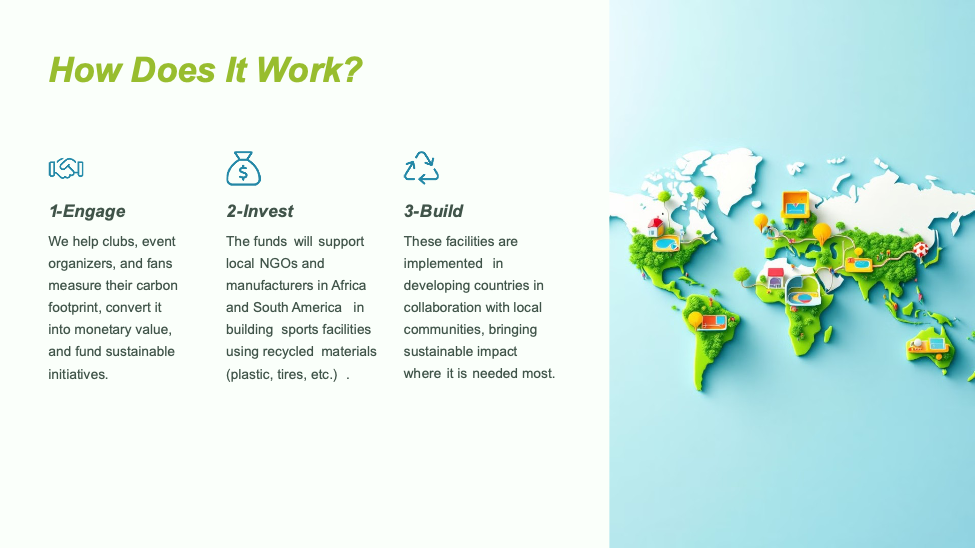About Us
Our History
Welcome to Climate Neutral Sports (CNS), where passion for sports meets a commitment to environmental responsibility. At CNS, we are dedicated to revolutionizing the sports industry by fostering a sustainable and eco-friendly approach. Our mission is clear: to lead the way in making sports thrilling, competitive, and environmentally conscious.
As a forward-thinking organization, CNS recognizes the profound impact that sporting events and activities can have on the environment. From resource consumption to carbon emissions, the sports industry significantly shapes our ecological footprint. It is a dynamic organization that helps sports clubs and fans achieve Net Zero.


Our motto is clear and straightforward: Play today, sustain for tomorrow! We believe that sports and environmental responsibility can coexist harmoniously, and we strive to provide innovative solutions by working collaboratively with sports clubs, fans, and enthusiasts to implement sustainable practices. From reducing and offsetting carbon emissions associated with sporting events to promoting eco-friendly playgrounds and contributing to the UN SDGs, our multifaceted approach addresses the environmental challenges of the sports industry.
Join us on our journey towards a climate-neutral sports future. Together, we can score a victory not only on the field but also for the planet. Explore our initiatives, get involved, and be part of the Climate-Neutral Sports community, where athleticism and environmental stewardship unite for a brighter, greener tomorrow.
Why we do it?
The urgent need to raise awareness and advocate for climate-neutral sports has never been more critical. The global sports industry, a powerhouse of entertainment and competition, is simultaneously contributing to the escalating challenge of global warming through its substantial carbon footprint. Estimates suggest the global sports industry is responsible for approximately 350 million tonnes of CO2 equivalent (CO2e ) on a yearly basis. In 2022, the FIFA World Cup Qatar generated an estimated 3.63 million tonnes of CO2e, while the total carbon footprint of the Tokyo Olympics 2020 was 1.96 million tCO2e.


As athletes and teams capture the world's attention, it becomes paramount for the sports industry to take a leading role in mitigating its environmental impact. By adopting sustainable practices, sports clubs can pave the way for change, influencing their operations and inspiring fans worldwide to embrace eco-conscious behaviors. The collective effort to reduce and offset the carbon footprint within the sports community is not just an option; it is a responsibility we owe to the planet. Now is the time for a transformative shift towards climate-neutral sports, where the passion for the game aligns harmoniously with a commitment to environmental stewardship, ensuring a sustainable legacy for future generations. This is the mission of Climate Neutral Sports.
How we do it?
We are developing climate projects to mitigate, reduce, and remove greenhouse gases from the atmosphere. To achieve this, we ask sports clubs and fans to contribute to these projects through our offsetting program. In other words, when a sports club or a fan compensates for its carbon footprint, it also indirectly funds a program to finance global climate action.
Traditionally, climate programs aim to reduce carbon emissions, protect biodiversity, and bring tangible benefits to local communities. There are various programs in which every organization or person can be involved, such as reforestation, biogas and biomass, solar energy, improved cook stoves, biodiversity, and plastic waste, to name a few. All of these contribute to improving our planet while also impacting the lives of local communities where the projects are being implemented. While we are aware that offsetting projects cannot continue to serve as cover for companies to maintain emissions and unsustainable practices we at CNS have decided to build playgrounds and other light sporting facilities in the global South (Africa, South America, and Southeast Asia) with recycled material (mainly plastic). We strongly emphasize achieving the SDGs while ensuring circularity within the sports industry and encouraging sports organizations to reduce their emissions drastically. We do not offer certificates or encourage greenwashing but allow funding projects with impact.

Our Network and affiliations
Climate Neutral Sports (CNS), a Swiss-registered nonprofit organization with IDE Number CHE-307.361.446, stands at the forefront of driving climate-friendly practices within the sports industry. It fosters a Net Zero approach for sports organizations and fans. At the heart of its impactful initiatives are strategic partnerships and affiliations that amplify the organization's reach and influence. CNS proudly aligns with esteemed entities such as Football for the Goals and the Sport for Climate Action; both UN initiatives aim to support and guide sports actors in achieving global climate change goals and provide a platform to engage with and advocate for the Sustainable Development Goals (SDGs). Furthermore, CNS is a proud member of prominent initiatives like the Science-Based Targets Initiative (SBTi), a driver of climate action in the private sector by enabling organizations to set science-based emissions reduction targets, and RESTOR, a global network of actors working together to advance restoration of the planet. More importantly, CNS works with the private sector, local authorities, and civil society organizations in countries where it works. This extensive network underscores its dedication to leveraging collective efforts and global collaborations to make the sports industry a powerful force for positive climate action.

Transparency and Verification
Transparency stands as the cornerstone of our commitment to environmental responsibility. Our carbon offsetting projects operate with meticulous attention to detail, ensuring that every aspect aligns with the highest standards of traceability and integrity. Our methodology is openly communicated, allowing stakeholders and the public to understand and scrutinize the process. We leverage cutting-edge technologies and adhere to globally recognized standards, providing a transparent and verifiable account of our efforts. Finally, CNS undergoes rigorous third-party verification processes to ensure the credibility and transparency of our emissions reduction initiatives.
By upholding this commitment to transparency, we aim not only to neutralize carbon emissions but also to inspire confidence in our clients, fans, partners, and supporters, fostering a collective dedication to sustainability within the dynamic world of sports.
FAQ
Climate Neutral Sports (CNS) stands out as an innovative force in the realm of carbon offsetting, specializing exclusively in the dynamic world of sports. Going beyond conventional offset projects like reforestation and clean energy, CNS offers a distinctive opportunity for the sports community to finance activities in low-income countries. By supporting projects such as recycling plastics to construct playgrounds and sports facilities, CNS ensures that sports are accessible to everyone, thereby significantly contributing to the achievement of the United Nations Sustainable Development Goals (SDGs). What makes CNS truly unique is its approach to fostering a global sports movement. By enabling sports clubs and fans to contribute to initiatives that go beyond carbon reduction, CNS unifies the sports community in a meaningful way, creating a lasting impact on both environmental sustainability and global sports accessibility.
Climate Neutral Sports (CNS) only deals with Voluntary Carbon Market (VCM), while there is another market, called the Mandatory (compliance) Market (MCM). Mandatory (Compliance) Markets are governed by national, regional, or provincial law and compel emission sources to meet GHG emission reduction targets. Because compliance program offset credits are generated and traded for regulatory compliance, they typically act like other commodity pricing. While Voluntary Carbon Markets enable carbon emitters to offset their unavoidable emissions by acquiring carbon credits generated by initiatives aimed at removing or decreasing GHG emissions from the environment. Companies can engage in the voluntary carbon market on their own or as part of an industry-wide program.
Carbon prices on the VCM can vary for several reasons, reflecting the complexity and diversity of the market. There are some key factors that contribute to the differences in carbon prices, such as market dynamics (demand and supply), quality and types of carbon credits, geographical locations, buyer preferences, project development costs, etc. In summary, the VCM is influenced by a combination of economic, environmental, and social factors. The diverse nature of carbon offset projects, coupled with varying market conditions, buyer preferences, and regulatory landscapes, contributes to the range of carbon prices observed in the voluntary carbon market.
A carbon offset is a unit of measurement representing the reduction, removal, or avoidance of one metric ton of carbon dioxide (CO2) or its equivalent in other greenhouse gas emissions. Individuals, businesses, sport clubs, or governments can purchase these offsets as a way to compensate for their own carbon emissions by investing in projects that reduce or capture an equivalent amount of greenhouse gases elsewhere. Carbon offset projects often include initiatives such as renewable energy projects, reforestation efforts, methane capture, and other activities aimed at mitigating climate change. The concept is based on the idea of balancing carbon footprints by supporting activities that contribute to a net reduction in overall greenhouse gas emissions.
Climate neutrality, also known as carbon neutrality, is the state achieved when an entity, such as an individual, organization, or nation, balances the amount of greenhouse gases it emits with an equivalent amount of emissions removed or offset. Achieving climate neutrality involves reducing emissions through sustainable practices, energy efficiency, and the use of renewable energy sources. Any remaining emissions may be offset by investing in projects that sequester or reduce an equivalent amount of greenhouse gases. The goal of climate neutrality is to contribute to global efforts to mitigate climate change by ensuring that the net impact on the climate is zero or near-zero.
Sport clubs, like any other entity, must offset their carbon footprint to demonstrate environmental responsibility and contribute to global sustainability efforts. Sporting events and club operations often involve significant energy consumption, travel, and resource use, leading to substantial carbon emissions. Offsetting these emissions through investments in renewable energy, reforestation, or other carbon reduction projects helps mitigate the environmental impact of sports activities. It aligns sports clubs with broader climate action goals, showcases a commitment to environmental stewardship, and sets a positive example for fans, sponsors, and the broader community. By taking steps to offset their carbon footprint, sport clubs play a crucial role in addressing climate change, promoting eco-friendly practices, and fostering a sense of social and environmental responsibility within the sports industry.
Sport fans should consider offsetting their carbon footprint to contribute to the global fight against climate change. Sporting events often involve significant travel, energy consumption, and waste generation, all of which contribute to greenhouse gas emissions. By voluntarily offsetting their carbon footprint, fans can take responsibility for the environmental impact associated with their attendance at games, travel to events, and other related activities. This proactive measure demonstrates individual commitment to sustainability and helps support carbon reduction projects, such as renewable energy initiatives or reforestation efforts. As fans collectively engage in carbon offsetting, they play a part in mitigating the overall environmental impact of sports, promoting a culture of climate-conscious behavior, and inspiring positive change within the sports community.
Climate Neutral Sports (CNS) operates with a mission to address the environmental impact of sports activities by collecting carbon offset funds from both sports clubs and fans. These funds are then strategically invested in projects with dual social and environmental benefits, primarily focusing on low-income countries. By doing so, CNS actively contributes to the United Nations Sustainable Development Goals (SDGs), fostering positive change in communities worldwide and combating climate change. Notably, CNS places a strong emphasis on financial transparency and accountability by ensuring the integrity of funds through third-party, independent verification processes. This commitment reflects CNS's dedication to ensuring that the carbon offset contributions are effectively utilized, aligning with the highest standards of credibility and impact.
Carbon Neutral Sports (CNS) strategically prioritizes the global south, encompassing regions such as Africa and South America and explicitly focusing on low-income countries. This approach has a triple objective: i) promoting ecological equity (the global north pollutes more than the south), ii) supporting a circular economy through upcycling activities, and iii) ensuring the longevity of sport by investing in future talents. All these are aligned with the broader objective of contributing to the United Nations Sustainable Development Goals (SDGs).
The United Nations Sustainable Development Goals (SDGs) are a set of 17 interconnected goals designed to address global challenges and promote sustainable development across economic, social, and environmental dimensions. The SDGs were adopted by all United Nations Member States in September 2015 as part of the 2030 Agenda for Sustainable Development. The goals aim to eradicate poverty, protect the planet, and ensure prosperity for all. Each goal is accompanied by specific targets and indicators to track progress. The SDGs provide a comprehensive framework for global cooperation to address pressing issues and create a more sustainable and equitable world by the year 2030.
Climate Neutral Sports (CNS) employs a rigorous methodology to calculate the carbon footprint associated with both sport clubs and fans, adhering to the internationally recognized GHG Protocol standards. The calculation process encompasses the three distinct scopes as outlined in international standards: Scope 1 (direct emissions), Scope 2 (indirect emissions from purchased energy), and Scope 3 (indirect emissions from activities outside the organization's direct control). Our dedicated team conducts thorough research to understand the intricacies of sport club operations and the habits of sport fans, ensuring a comprehensive and accurate assessment. By utilizing the GHG Protocol standards, CNS ensures transparency, consistency, and alignment with global best practices in carbon accounting, enabling us to quantify and offset the environmental impact of sports-related activities in a credible and standardized manner.
It's important to note that Climate Neutral Sports (CNS) operates as a company rather than a non-profit organization. As such, carbon offset purchases made with CNS are not considered donations, and, consequently, they are not eligible for tax deductions. The funds generated through these purchases are utilized to finance the specific projects outlined by CNS, contributing to the company's mission of promoting sustainability within the sports industry. While CNS is committed to environmental and social impact, its structure as a company distinguishes the nature of carbon offset transactions from traditional charitable donations.
Carbon prices on the VCM can vary for several reasons, reflecting the market's complexity and diversity. Some key factors contribute to the differences in carbon prices, such as market dynamics (demand and supply), quality and types of carbon credits, geographical locations, buyer preferences, project development costs, etc. In summary, the VCM is influenced by a combination of economic, environmental, and social factors. The diverse nature of carbon offset projects, coupled with varying market conditions, buyer preferences, and regulatory landscapes, contributes to the carbon prices observed in the voluntary carbon market.
According to the UN, “Greenwashing presents a significant obstacle to tackling climate change. By misleading the public to believe that a company or other entity is doing more to protect the environment than it is, greenwashing promotes false solutions to the climate crisis that distract from and delay concrete and credible action”.
Climate Neutral Sports' offsetting program, which uses recycled materials to build sports facilities in the global South, is not greenwashing because it delivers tangible environmental and social benefits. The initiative reduces landfill pollution and lowers the carbon footprint associated with new construction by repurposing waste materials. Additionally, it fosters community development by providing essential infrastructure for sports and recreation, promoting health and social cohesion. The program's transparency, measurable impact, and alignment with circular economy principles distinguish it from superficial sustainability claims, ensuring it contributes meaningfully to both climate action and local well-being.
Like any other entity, sports clubs must offset their carbon footprint to demonstrate environmental responsibility and contribute to global sustainability efforts. Sporting events and club operations often involve significant energy consumption, travel, and resource use, leading to substantial carbon emissions. Offsetting these emissions through investments in renewable energy, reforestation, or other carbon reduction projects helps mitigate the environmental impact of sports activities. It aligns sports clubs with broader climate action goals, showcases a commitment to environmental stewardship, and sets a positive example for fans, sponsors, and the wider community. By offsetting their carbon footprint, sports clubs play a crucial role in addressing climate change, promoting eco-friendly practices, and fostering a sense of social and environmental responsibility within the sports industry.
Sports fans should consider offsetting their carbon footprint to contribute to the global fight against climate change. Sporting events often involve significant travel, energy consumption, and waste generation, contributing to greenhouse gas emissions. By voluntarily offsetting their carbon footprint, fans can take responsibility for the environmental impact associated with their game attendance, travel to events, and other related activities. This proactive measure demonstrates individual commitment to sustainability and helps support carbon reduction projects, such as renewable energy initiatives or reforestation efforts. As fans collectively engage in carbon offsetting, they play a part in mitigating the overall environmental impact of sports, promoting a culture of climate-conscious behavior, and inspiring positive change within the sports community.
Sports fans should consider offsetting their carbon footprint to contribute to the global fight against climate change. Sporting events often involve significant travel, energy consumption, and waste generation, contributing to greenhouse gas emissions. By voluntarily offsetting their carbon footprint, fans can take responsibility for the environmental impact associated with their game attendance, travel to events, and other related activities. This proactive measure demonstrates individual commitment to sustainability and helps support carbon reduction projects, such as renewable energy initiatives or reforestation efforts. As fans collectively engage in carbon offsetting, they play a part in mitigating the overall environmental impact of sports, promoting a culture of climate-conscious behavior, and inspiring positive change within the sports community.